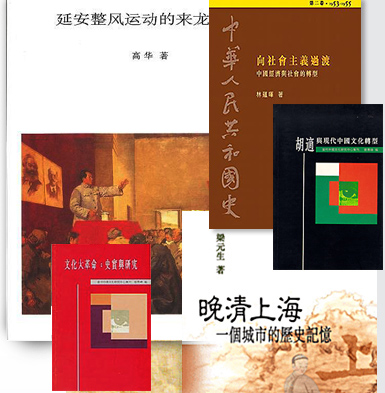中心簡介
書籍出版
研究計劃
中國近現代思想史全文檢索數據庫
《二十一世紀》 雙月刊
學術活動


書籍出版 > 中國近現代史研究 > From Youthful Manuscripts to River Elegy

|
||||
| From Youthful Manuscripts to River Elegy: The Chinese Popular Cultural Movement and Political Transformation 1979-1989 |
||||
| By Chen Fong-ching & Jin Guantao | ||||
| 香港中文大學中國文化研究所當代中國文化研究中心專刊(二) | ||||
| 1997 24.5 × 16cm 355頁 | ||||
| ISBN 962-201-762-2 定價: US$27 / HK$200 |
||||
| 本書簡介 Among the many books dealing with the epochal changes of China during the eighties, this is probably the first full-length account of the popular cultural movement, or wenhuare. It is the result of collaboration between two Chinese intellectuals: a Beijing cultural activist who had himself played a central role in the movement, and a Hong Kong academic who had made first-hand observations of many of the events described. However, it is not personal experience, but rather interviews and documentary evidence on which this work is founded. The narrative has two parallel lines of development, which constantly interact with each other: the political transformation of China during the critical dozen years 1977-89; and the cultural movement itself. The latter is followed from an abortive attempt in 1982 to publish the minjian journal Youthful Manuscripts, through the blossoming of many popular cultural enterprises, including the potent River Elegy television series, and finally to the Tiananmen tragedy, at which point the two lines of development finally coalesced. The book is filled with details, including the background, character, and personal connections of a large number of people who are related to the movement, which make interesting reading and can be a useful source for further studies. Two important (and somewhat surprising) links emerge from this essentially historical study: first, the origin of the movement is traced through Beijing University to earlier generations of intellectuals and hence the May Fourth Movement; secondly, it turns out that, even though the impetus of the movement came from intellectuals acting outside official channels, what had made it possible was really the tolerance, and even the good will and support of progressive elements within the Party. In this context the future role of Chinese intellectuals in the rapidly changing post-Deng China is discussed towards the end of the book. |
||||
| 作者簡介 Chen Fong-ching is the director of the Institute of Chinese Studies of The Chinese University of Hong Kong, a founder of the journal Twenty-First Century bimonthly, and the chief editor of the Under the Impact of Modernization book series. Jin Guantao had been the chief editor of the Towards the Future book series, and is presently a senior research fellow at the Institute of Chinese Studies. Together with Liu Qingfeng, he is the author of The Cycle of Growth and Decline—On the Ultrastable Structure of Chinese Society and The Transformation of Chinese Society (1840–1956). |
||||
| 本書目錄 | ||||
| Preface | ||||
| Abbreviations and Special Terms | ||||
| Introduction | ||||
| Prologue | ||||
| 1 | From Catastrophe to Recovery | |||
| 2 | Making a New Start | |||
| 3 | Finding a Minjian Cultural Space | |||
| 4 | A Revival of the Intellectual Tradition | |||
| 5 | The Emergence of a Cultural Movement | |||
| 6 | From Setback to Yet Greater Success | |||
| 7 | The Gathering Storm | |||
| 8 | A Fateful Encounter with History | |||
| Epilogue | ||||
| Conclusion | ||||
| Appendices A | Chronology of Major Events | |||
| Appendices B | Participants in Selected Cultural Activist Groups and Events | |||
| Glossary | ||||
| Bibliography | ||||
| Index | ||||







